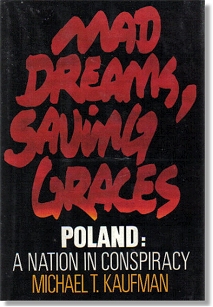 |
| via |
"Poland is a symbol--a symbols of all which the best of the human race have loved, and for which they have fought. Everywhere in Europe where there has been any fighting for freedom in this century, the Poles have taken part in it...they still look on anyone who fights for freedom as a brother. ...The future fate of Poland is wholly dependent on that of Europe; for if the idea of the right of the people to independence and the right of every nation to full political freedom continually gains ground int he world, then the hour is drawing near when the resurrection of Poland shall be something more than a hope."Kaufman displays great craft by blending history with the sensibilities of non-fiction. The very first chapter acknowledges two things about Poland: it is absurd and they live in their history. Poland is absurd. The police state that was Soviet Poland had a dual nature to it. Kaufman himself notes that arriving in the airport, all 47 volumes of books he brought were carefully inspected by authorities and returned weeks later, but a male transvestite in high heels and a short skirt can nonchalantly walk past policemen. There is also the case of Czesław Niemen, whose psychedelia could not be contained. He performed on television the famous "Bema pamięci żałobny rapsod", which is an ode to Józef Bem, a nationalist hero that served as inspiration for the 1956 revolutions in both Poland and Hungary. As Applebaum's book discusses the early years of the Catholic church in Soviet Poland and this laid the foundation for an oppositional church that was instrumental in aiding Solidarność. Russia had given up on taming Poland entirely and let the Catholic church flourish, which was completely unlike the other satellites. The absurdities of Poland were mostly due to the vise grip of the Soviet overlords and the bizarre wriggling that slipped in between their fingers. What was common to all satellites was the duality of Soviet life, but this takes on a new meaning in the Polish context.
The novel connects Kaufman's father to the movement he saw in the late 80s. There was an entire society existing underground, with particular points of contact to the outside world. In some ways it is surreal, but in other ways it was a far more surreal in the outside world. What Kaufman finds is that there are long traditions of subversive behavior in the name of freedom; fighting for an ideal that they have seldom seen come to fruition. This is where history steps in and plays a role in contemporary society. Kaufman's search in Poland deepened his understanding of his father's actions while understanding the role that legacy of freedom fighting plays in Poland today. The fights of their fathers are theirs--they see themselves as continuing to fight the good fight. This strikes a chord deep within their hearts and it is why the Solidarity movement gained as much steam as it did. The poetry and the valor they heard and lived was suddenly realized in a group of people supporting a fight against an oppressive system. Even in the heat of the moment, as they were suffering for rebelling, they always saw the larger historical narrative and felt as though their actions were to be written about, ready to inspire the next generation. Adam Michnik says it all when he states, "The world has decided that it is more noble to die with a gun in your hand than to go silently to your death..." (189).
Since Kaufman is Jewish, there is an entire chapter devoted to "The Ghosts of Jews". Michnik, a Polish Jew himself, remarked on the double edged sword of Judaism in Poland: that you are criticized both for being a Jew and not being Jewish enough. In the late 80s, Poland started holding commemorative events for the 1943 ghetto uprising and inviting dignitaries from Israel. But the chapter concludes with a prick to the conscience of freedom fighting Poles: "Polish Jewry is dead," Marek Edelman said in an interview for Czas newspaper. When the interviewer replied it had not died and that memories remained, he retorted, "No, don't speak nonsense. Nothing has remained. There are memories and literature but nothing remains when it cannot create anything further." Kaufman observes that Jews are no longer a force politically or economically, but "they lived in Poland so long and their deaths were so awesome that they remain a profound historical presence in a country that lives through its history. They remain to prick consciences and validate policies and claims to honor. They torment and they need to be appeased. They are unavoidable. Like ghosts" (193).
Then the sweeping winds of history took the upheaval and gave Communism back to its masters. The history of Poland found its first sound victory, though tinged with cowardice. Their valor in the past still serves as a beacon and Jewishness continues to prick at their conscience, but Poland is moving forward and taking up the moral beacon in the EU. They are fighting for the ultimate unity of free states and protecting the interest of freedom; stepping up to the plate is their destiny and if Brandes was right, then Poland is the pulse of Europe. Kaufman puts our hand on the pulse to feel the echoes of time. The stories still ring through today and this book gives us a look into how Poland has constructed itself. A thorough and interesting read, not dense or academic, though not lacking knowledge or authority.
Addendum: Today is Casimir Pulaski Day here in Illinois, and this could not be a more fitting book review for the holiday! Thank you Kazimierz Pułaski. You're part of the reason my country exists and for that I am grateful, because I love Poland and my country, particularly my city of Chicago.
